
Purchasing Submission: Conditions, Power, and Freedom
by Philip Hamburger
Harvard University Press
336 pp., $35.00
Philip Hamburger is one of the most important legal scholars in America. His Is Administrative Law Unlawful?, published in 2014, is an essential book. It describes the proliferation of the administrative state, which is perhaps the greatest monstrosity of modern American political life. In Hamburger’s words, it is “extralegal, supralegal, and consolidated.” Produced by executive agencies that grow in size and scope every year, the administrative state exercises absolute power and eludes challenges from the normal political process.
In Purchasing Submission, Hamburger turns from the administrative state to another cancerous growth of governmental power that operates parallel to the constitutional framework. Here, the federal government’s sheer purchasing power becomes another means of sidestepping the Constitution and dominating citizens outside the rule of law.
There are many examples. Federal welfare assistance is contingent on granting the state physical access to one’s home to determine the extent of need. Tax exemptions are awarded to religious institutions on the condition that they refrain from engaging in political speech. Title IX and Institutional Review Board grants require recipients expressly to give up speech rights. A particularly troubling recent example of federal buy-off power is President Biden’s egregious tying of subsidized school lunch to the requirement that those schools allow students suffering from gender dysphoria to use bathrooms that do not match their biological sex.
Hamburger is a committed federalist. He sees politics—the election by citizens of representatives who pass legislation—as the legitimate method for resolution of most questions regarding American public policy. The Founders recognized that much of our collective life relied on the political activity of citizens rather than on mechanisms of power that leap over our agency. One might well wonder, however, whether contemporary Americans are up to the task the Founders set for us. Are we still capable of responsible self-government, or have we become satisfied to sit hypnotized before our social media while the state steadily steals our political sovereignty right under our noses?
Hamburger’s argumentative style is as limpid as a spring-fed stream, but a few of his examples of what constitutes an act of coercion by the state raise questions. He sees as illegitimate, on the grounds of federalism, the tying of Justice Department funding for municipalities to the demand that they cooperate with federal efforts to enforce immigration law. But immigration is not a matter that can be left to the decision-making of individual states. Even if federalism were applied in this case, the result would be undesirable. Given the porous borders between states, those with restrictive immigration policies would be forced to manage the immigrant overflow from neighboring states with more liberal policies.
Hamburger also emphasizes that the tactic of purchasing submission disproportionately affects poorer Americans. A related political-philosophical question, however, escapes his attention. On what principle should the poor have a legal claim to material resources they have not earned, without the necessity of any return to the individuals who provided those resources?
It is a moral good that we provide the needy with the means to subsist. But it is also a moral good that they demonstrate gratitude for that gift, in the form of adherence to the rules of the social group that provided it. It would be a moral evil to provide resources to the poor if those resources were used to do demonstrable harm: for example, to purchase and consume illegal drugs. In this sense, a requirement of drug testing for those on welfare is perfectly morally sound, even if it forces submission to a rule the receiver would rather avoid.
At several points, Hamburger invokes Alexis de Tocqueville and his prescient commentary on the dangers of “government benevolence” that presents potentially authoritarian consequences. I would go still further than Hamburger does in tapping the great Frenchman’s work on this topic, for he recognized that a democratic society would need something beyond a good legal system and a constitution to enable robust and morally healthy political participation by its citizenry. Something beyond or, better put, underneath those legal principles.
As Hamburger recognizes, law in a society like ours rests on the consent of the governed, but law operates in all cases according to a logic of force as well. What determines the moral nature of that force? The distinction between good law and bad has to do with the moral culture underlying and authorizing it. Hamburger is correct that contract is a terrible way of thinking of the relationship between citizen and state. But thinking solely of unaided constitutional principle as the guiding force of political action is equally limited. As Joseph de Maistre, another great 19th-century French political theorist, recognized, unwritten principle descending from unimpeachable authority must undergird a constitution if it is to avoid inevitable moral drift as the population and its beliefs change.
That permanent source is religion. Tocqueville understood that deep religious belief spread throughout a polity provides a check on the most dangerous propensities of democratic societies, which are prone to radical self-interest and love of material pleasures. At the time of Tocqueville’s writing, he observed that in America democracy was better protected against these dangers than in his native France. In the latter, self-interested pursuit of material comfort led easily to debauchery. In America, however, Tocqueville found self-interest of a more enlightened variety. Here, self-love extended to mutual aid among citizens, and the desire for material pleasure was constrained by the fact that even the wealthiest Americans shared the tastes of the common people.
Tocqueville was critical of religious institutions playing too direct a role in statecraft, yet he believed that political figures in a religiously grounded society would assume part of the burden of directing citizens away from merely individualist, materialist concerns and point them instead to distant, spiritual goals that are the proper end of their political lives. His entire analysis of the role of religion in American democracy echoes the well-known statement of the country’s second president, John Adams: “Our Constitution was made only for a moral and religious people. It is wholly inadequate to the government of any other.”
Tocqueville also discussed the danger of alienation in democracy. Even a finely composed constitution such as our own cannot morally root citizens cut loose from the anchor of religious faith. An anarchic individualism is always a threat in democracies. But still more dreadful—and more likely—is the servitude that arises in a people turned morally rudderless before an ever-growing and more powerful state.
As citizens recognize their weakness and vulnerability in conjunction with their attachment to material well-being, they will be only too happy to see the paternalistic state take on more and more of the function of providing for them. What Tocqueville refers to as “the science of administration” grows ceaselessly. Its tendrils spread promiscuously through all regions of the nation. Effective central organization might result, but that environment necessarily correlates with the disappearance of initiative and autonomy in the citizenry.
There is a striking description in Democracy in America of a nightmarish vision of a dystopian future. Today, it is our reality in the form of the authoritarian power Hamburger describes. Tocqueville imagined
an innumerable multitude of men, alike and equal, constantly circling around in pursuit of the petty and banal pleasures with which they glut their souls.… Over this kind of man stands an immense, protective power which is alone responsible for securing their enjoyment and watching over their fate. That power is absolute, thoughtful of detail, orderly, provident, and gentle. It would resemble parental authority if, fatherlike, it tried to prepare its charges for a man’s life, but on the contrary, it only tries to keep them in perpetual childhood. It likes to see the citizens enjoy themselves, provided that they think of nothing but enjoyment.…It provides for their security, foresees and supplies their necessities, facilitates their pleasures, manages their principal concerns, directs their industry, makes rules for their testaments, and divides their inheritances. Why should it not entirely relieve them from the trouble of thinking and all the cares of living?
What is this, if it is not the American citizen in 2022, standing in near complete thrall to the federal government’s largesse? Tocqueville predicted it, and Hamburger has documented its manifestation. Sadly, it is unclear whether anything can wake the American citizenry from its somnambulistic state.
Top image: A giant puppet sleepwalks through a festival in Birmingham, England, in 2015. (Dauvit Alexander / Flickr, CC BY-NC-SA 2.0)

Leave a Reply